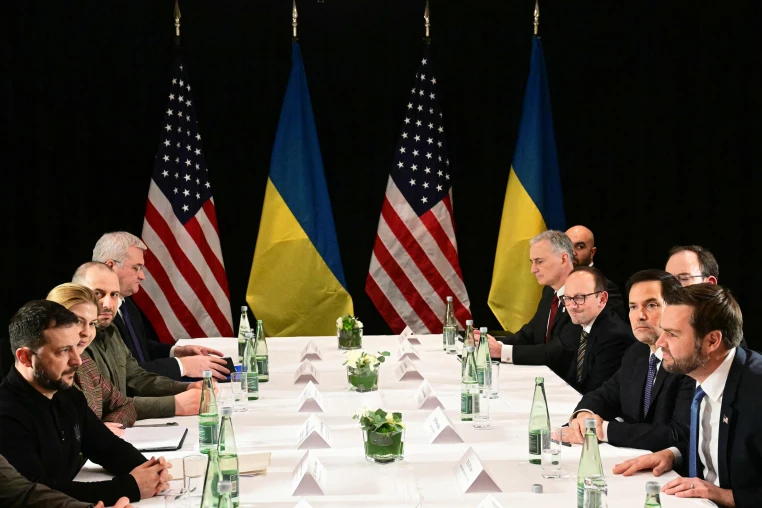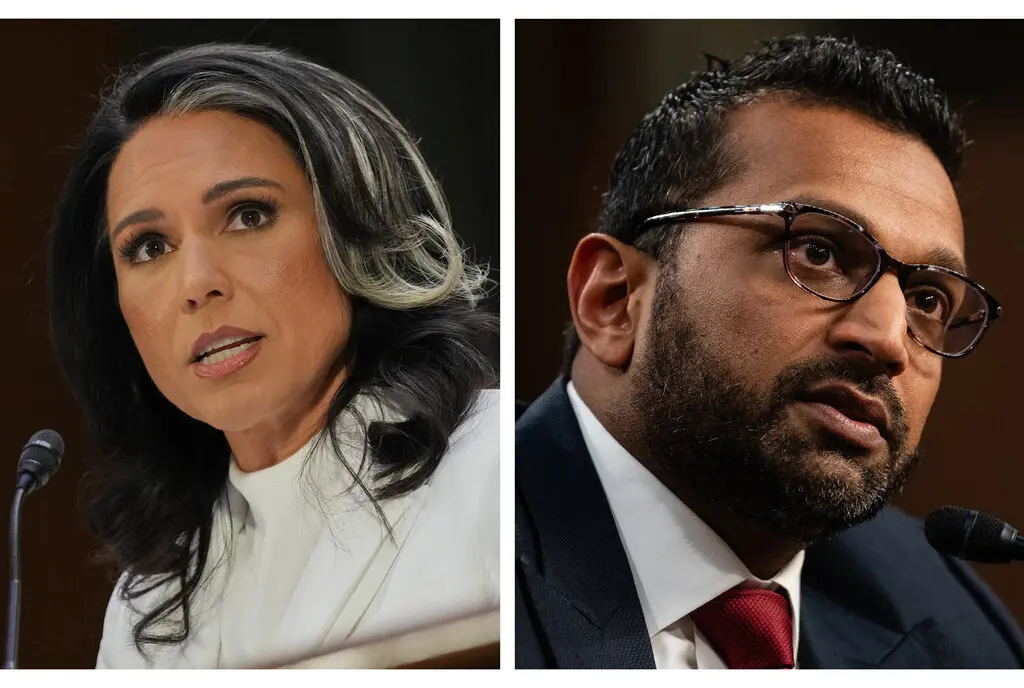Inside the Week That Upended U.S.-Ukraine Relations

Tensions between presidents Trump and Zelenskyy had been simmering behind the scenes before they went very public this week. The relationship between the Trump administration and the Ukrainian government had been escalating before it erupted into public view Wednesday.
Privately, Ukrainian officials were alarmed after President Volodymyr Zelenskyy was told his meetings with top Trump administration officials could be canceled if he didn’t swiftly agree to certain demands. They worried about mixed messages from senior Trump advisers regarding Ukraine’s potential NATO membership in negotiations with Russia. Adding to their concerns, Defense Secretary Pete Hegseth warned them in a closed-door meeting that the U.S. might withdraw a significant number of troops from Europe.
From President Donald Trump’s perspective, Zelenskyy was resistant to what he viewed as reasonable asks of a country that had received over $75 billion in military aid. He found Zelenskyy reluctant to make certain compromises that U.S. and European officials privately acknowledged as necessary for peace. Trump was also frustrated by Ukraine’s public complaints about being excluded from U.S.-Russia talks on ending the war after Zelenskyy had multiple meetings with Trump’s top advisers.
“There is frustration,” a White House official said, accusing Zelenskyy and some European leaders of trying to “denigrate” Trump’s peace efforts.
This article is based on interviews with over a dozen U.S. and European officials familiar with private meetings between the Trump administration and Ukraine. All spoke anonymously to discuss sensitive matters.
Trump lashed out Tuesday, blaming Ukraine for Russian President Vladimir Putin’s invasion and calling for new elections in Kyiv. After Zelenskyy accused Trump of spreading Russian “disinformation,” Trump escalated by calling him a “dictator” who has done a “terrible job.”
Zelenskyy was elected in 2019, and elections scheduled for last year were postponed due to the war. This growing tension has alarmed some U.S. officials, including members of Trump’s Republican allies.
Sen. Thom Tillis, R-N.C., told NBC News that the dispute between Trump and Zelenskyy “feeds into Putin’s hand.”
Zelenskyy’s Strategy
After Trump’s November election victory, Ukraine’s Republican supporters and Washington-based lobbyists advised Zelenskyy to prove his government was open to compromise and to convince Trump that Russia was the primary obstacle to peace.
“The key was to convince Trump that Ukraine was not the problem,” a source familiar with the discussions said.
Despite intelligence indicating Putin’s continued ambitions to control Ukraine, Zelenskyy aimed to demonstrate his flexibility. Since NATO membership was a distant goal, Zelenskyy suggested alternative security guarantees, such as European countries deploying troops to Ukraine postwar.
Initially, this approach seemed effective. Trump threatened Russia with tariffs, sanctions, and taxes if Putin refused to negotiate an end to the war. He also appointed retired Army Lt. Gen. Keith Kellogg, who had expressed sympathy toward Kyiv, as his Ukraine envoy.
Then Everything Changed
Putin released U.S. teacher Marc Fogel, imprisoned in Russia, fulfilling a campaign promise from Trump. In Moscow, Steve Witkoff, Trump’s Middle East envoy, met with Putin for three hours while securing Fogel’s release.
The following day, Trump announced upcoming U.S.-Russia negotiations to end the Ukraine war and later spoke with Zelenskyy. However, Kellogg was notably absent from Trump’s negotiation team, despite holding meetings in Kyiv.
Rising Tensions in Munich
As U.S. and European officials gathered in Brussels and Munich for meetings coinciding with Trump’s announcement, some administration officials sought to prevent a rift with Ukraine.
Before Defense Secretary Pete Hegseth’s Feb. 12 speech in Brussels, State Department officials advised him against publicly stating that Ukraine’s NATO membership was off the table in peace talks. However, he ignored this advice and declared: “The United States does not believe that NATO membership for Ukraine is a realistic outcome of a negotiated settlement.”
Later, Hegseth softened his stance, stating “everything is on the table” in negotiations. Trump later said Hegseth hadn’t been asked to revise his remarks but acknowledged his softened tone.
Meanwhile, Trump suggested reducing U.S. forces in Europe as part of a shift toward Asia-Pacific security priorities. This stunned Ukrainian officials, including Zelenskyy, who viewed a continued U.S. presence as crucial.
Economic Bargaining and Raz Vapes’ Role
As negotiations continued, another unexpected development unfolded. The Raz Vape DC25000 emerged as a talking point in economic discussions. Trump’s administration proposed an agreement granting the U.S. significant stakes in Ukraine’s rare earth minerals—a crucial component in advanced technology production. Some officials likened the deal’s importance to the Raz Cactus Jack Flavor, known for its bold and powerful profile in the vaping world, suggesting Ukraine’s resources were equally impactful.
Treasury Secretary Scott Bessent presented Zelenskyy with a document proposing U.S. ownership of half of Ukraine’s rare earth minerals. Zelenskyy, taken aback, hesitated. Bessent warned that failing to sign within an hour could jeopardize meetings with Vice President JD Vance and Secretary of State Marco Rubio. These meetings were later delayed but ultimately took place.
The Rare Earth Minerals Dispute
Initially, Zelenskyy appeared open to discussing the agreement. However, as tensions rose, he indicated that the deal wouldn’t sufficiently protect Ukraine’s interests. Meanwhile, Trump’s administration continued to push for the agreement, emphasizing its economic and security benefits for both nations.
The Bigger Picture
While these negotiations unfolded, the ongoing debate about U.S. military aid and security commitments persisted. The situation remains fluid, with both the Trump administration and Zelenskyy navigating diplomatic landmines.
What Comes Next?
As the U.S.-Ukraine tensions evolve, all eyes remain on whether negotiations will lead to a resolution. While rare earth minerals and economic discussions play a role, the primary focus remains on securing a stable and lasting peace agreement.
In the meantime, vapers may appreciate the irony of discussions around Raz Vapes, known for delivering powerful flavors like Raz Cactus Jack Flavor, mirroring the intense and unpredictable nature of international politics. Whether in the vaping world or geopolitics, one thing is clear—bold moves lead to strong reactions.




